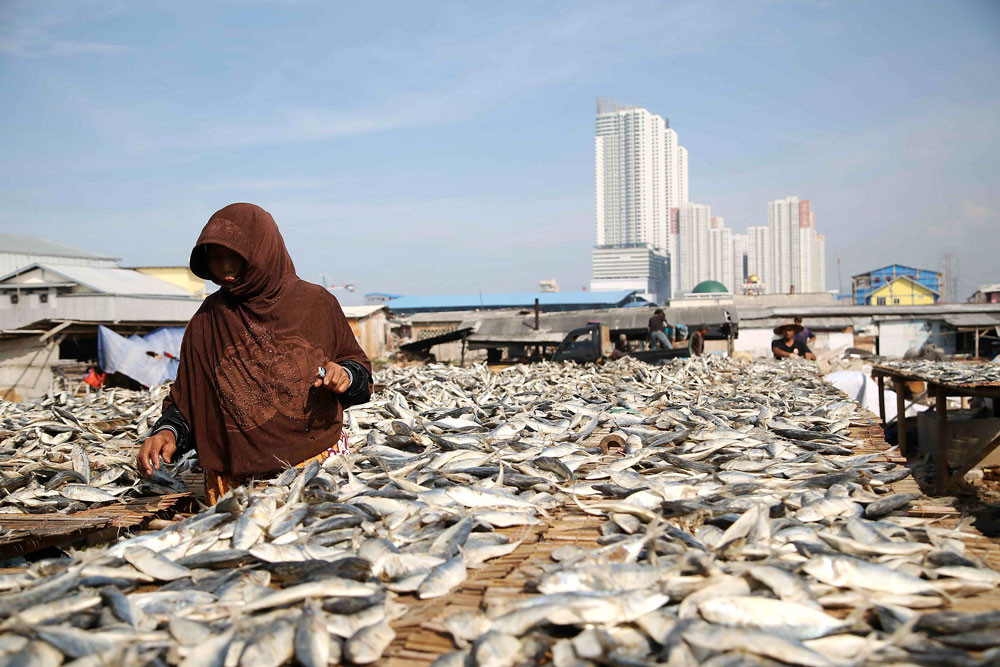Popular Reads
Top Results
Can't find what you're looking for?
View all search resultsPopular Reads
Top Results
Can't find what you're looking for?
View all search resultsSustainable investment in fisheries
National banks consider the fisheries sector unbankable as they are considered to be high risk and thus subject to high potential for default.
Change text size
Gift Premium Articles
to Anyone
I
nvestment is the most difficult challenge for the development of fisheries sector in Indonesia. Although it’s the largest archipelagic country with abundant fisheries potential, Indonesia has not been able to achieve social economic optimal results. Various obstacles such as limited supporting infrastructure, capacity and capability of fishermen, access to capital and others are difficult to resolve thoroughly due to limited government ability.
Investment in large quantities is needed to encourage the overall development of the fisheries sector. It cannot only depend on government support. At present there are only two state-owned enterprises (SOEs) engaged in fisheries -- PT Perikanan Nusantara (Perinus) and PT Perikanan Indonesia (Perindo). Both are still trying to rebuild their strength, thus they still need time to play a strategic role in fisheries.
There needs to be support from other SOEs and the private sector in developing fisheries. Management expert Rhenald Kasali has written that every country, in addition to requiring many micro, small and medium enterprises to provide massive employment, also requires a powerhouse to develop its technology and natural resources.
A “powerhouse” -- a large scale company that can move efficiently and quickly in adopting and developing technology -- can be an SOE, a private company or a combination of both.
The fisheries sector also requires powerhouses capable of being prime movers and locomotives. In the period of 2010-2014 realization of domestic investment in the sector only reached Rp 41.6 billion (US$ 2,967,718). Meanwhile in 2015-2017 the investment in fisheries reached over Rp 300 billion. Foreign investment in the same period was around Rp 100 billion, according to the Investment Coordinating Board (BKPM) in 2018. This value is still very minimal for fisheries. Without investment, the driver of the sector only consists of government expenditure, consumption and export-import activities. Without significant investment, other activities such as export imports will also be affected.
National banks consider the fisheries sector unbankable as they are considered to be high risk and thus subject to high potential for default. The main factor that causes slow investment in fisheries is inappropriate and immeasurable investment policies. Without the right policies, it is difficult to attract investors to develop the sector sustainably.
The Maritime Affairs and Fisheries Ministry has provided incentives for foreign investors in the processing, distribution and warehousing sub-sector by freeing up 100 percent of foreign capital ownership participation through Presidential Regulation No. 44/2016. Yet until now these incentives have not significantly boost investment.
Other policies complicating investment include licensing, the application of high non-tax state revenues to transshipment and other processes. Scores of idle fishing vessels in various ports is evidence of policies in capture fisheries that need to be reviewed.
Government incentives also need to be evaluated for effectiveness. As suggested in Superfreakonomics by the economist Stephen J. Dubner and journalist Steven Levitt, the incentives provided must be an integral part of the government's investment strategy.
Investment should be carried out on a sustainable principle, and in line with national needs and regional development priorities. It should also maintain production and environmental sustainability. Investment and a portionof profits should further empower the local communities through sustainable programs.
Environmental conservation and community empowerment is indispensable in supporting sustainable investment to avoid environmental destruction, and to prevent violation of rights of the peoples living around the fisheries business area, both in aquaculture and fish catching.
Synchronizing central and regional policies is needed to avoid policy clashes that actually prevent investment. Synchronization is also urgent in port management. The quality of fisheries port management with international standards would ensure the highest quality of fish landed in the port. The Urk fishing port in the Netherlands is a very good role model for Indonesia. It implements the integrated fish trading system from landing until distribution while trading adopts the stock exchange model.
Integrated fish trading systems such as the stock exchange would maintain fish prices and improve the welfare of fisherpeople. The system will also encourage fishing vessels from other countries to land their catches in Indonesia. The concept can be applied in Cilacap, Central Java with abundant potential in tuna especially, given the adequate infrastructure. Tuna has the world’s highest economic value among fish. Massive fish landings not only attract investors, but would also encourage increased exports and significant employment.
An investment strategy in fisheries that is right on track with regional and national needs will spur sustainable investment. Slowly but surely fisheries would be a prime mover of the economy of this maritime nation.
***
The writer holds a PhD in environmental science from University of Indonesia. His research focused on sustainable fisheries and economic resources.










